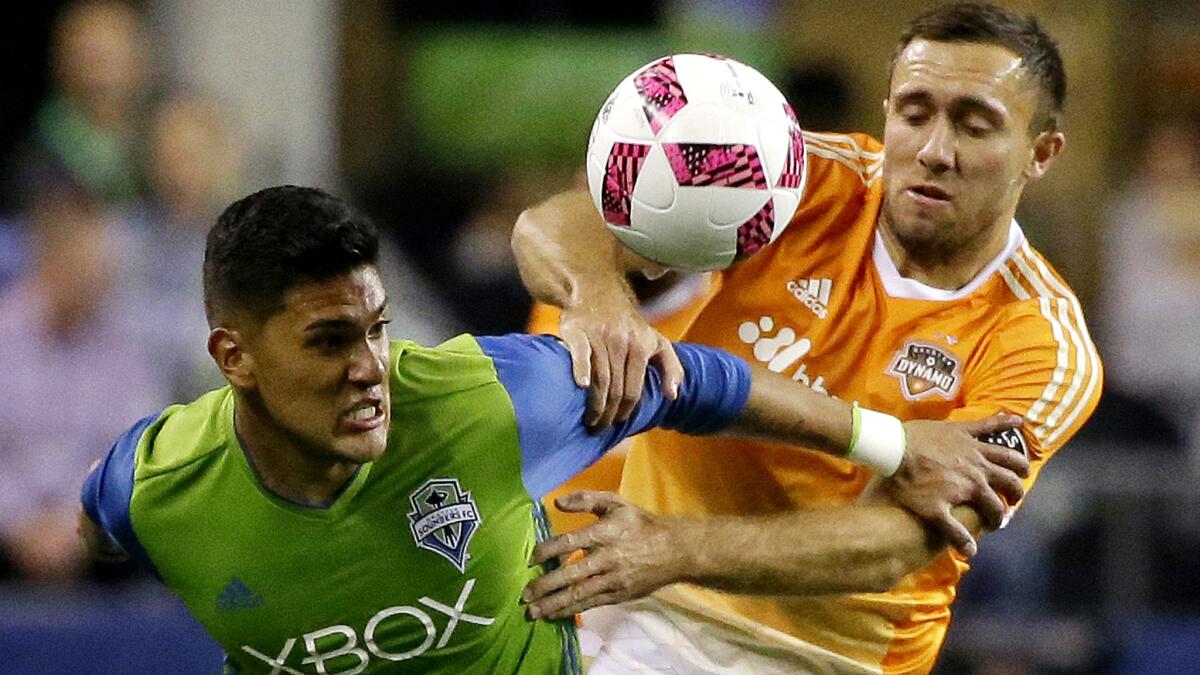Column: Houston proves relegation argument isn’t worth promoting in MLS

Whatever fleeting hopes the Houston Dynamo had of making the MLS playoffs were dashed two months into the season, after the team won just one of its first eight games. Less than three weeks later the Dynamo effectively waved the white flag, dumping Coach Owen Coyle and assigning longtime assistant Wade Barrett to guide the team through the rest of a lost year.
For the conspiracy theorists, who insist Major League Soccer will never be taken seriously without promotion and relegation, Houston’s rapid implosion looked to be Exhibit A in their argument. With little chance of reaching the playoffs and no chance of being relegated to a lower league, the Dynamo, the theorists insisted, had little motivation to do anything other than sleepwalk through their schedule.
Turns out the theorists were wrong because in the last seven weeks Houston (7-13-12) not only has refused to quit, it has upset the postseason plans of three conference opponents and has a chance to wound a fourth Sunday afternoon when it plays host to the Galaxy (11-6-15), who desperately need a win to secure a home date for their playoff opener.
And Barrett says that surge has been fueled by something more powerful than the embarrassment of relegation.
“Professional pride should be enough,” he said. “You don’t get to do this for very long. As a player, even if you’re at the top of your game… it’s a short career.
“So there’s motivation to do well every single time you step out there.”
That obviously isn’t something the backers of promotion and relegation had factored into their argument. Under that system, practiced in most of the world’s top leagues, the bottom three teams in the table at season’s end are relegated out of the first-division league and replaced by the top three teams from the second-division league. If that rule was recognized in MLS, Houston, the Chicago Fire and either Vancouver or Orlando City would be facing demotion to the financially troubled North American Soccer League. The New York Cosmos, FC Edmonton and Miami FC entered the weekend in line for promotion.
The problem is that model was invented in soccer-mad countries long before the advent of broadcast rights and multimillion-dollar stadiums. It remains a nonstarter in MLS, the world’s youngest major league and one still struggling for both financial footing and relevance in North America’s crowded sports landscape.
Consider that three of the last four teams to join the league — Minnesota, LAFC and New York City — paid expansion fees of at least $100 million; Atlanta and Orlando City spent $70 million. LAFC, Orlando City and Minnesota have also earmarked more than $150 million each to build soccer-specific stadiums.
That’s money the franchises could not hope to recoup playing NASL teams like Rayo OKC, whose home field is a high school stadium in Yukon, Okla.
“I don’t think promotion and relegation is going to happen in the near future,” Barrett said, an opinion repeatedly voiced by the league. “Atlanta is putting in a ton of money. What are you going to tell them if they don’t have a great start? That after one year they have to drop down?”
So MLS adopted the North America playoff model instead, one that holds out the carrot of a postseason invitation for the top six teams in each 10-team conference. But that doesn’t always concern teams at the bottom of the table, some of whom were all but mathematically eliminated from playoff contention by mid-season this year.
Relegation, the argument goes, is the only thing that will keep those clubs from emulating the tight-fisted Philadelphia 76ers, who have just one winning record in the last 11 seasons yet have still shared in the NBA’s riches.
Barrett argues differently. Unlike the NBA, few MLS contracts cover more than one season, so performance at the end of this year may well determine if a player will be asked back next season. Meanwhile for the franchises — and for coaches such as Barrett, an interim manager — finishing the season on a positive note can also carry over to next year, which may explain how Colorado has gone from a last-place finish in 2015 to the best record in the league in 2016.
“In our group, we are building something. We are establishing a foundation for this team moving forward,” Barrett said.
“We all know where we are in the standings. That’s the frustrating part for all of us. It’s hard to erase what happened in the beginning of the season. But what we have done since the end of May, I really do feel like we’ve established an identity as a team.”
Part of that has involved smashing the playoff hopes of other teams. Last Wednesday in Seattle, Houston prevented the Sounders from virtually wrapping up a postseason invitation by playing them to a scoreless draw. In September, they drew Sporting Kansas City and beat Real Salt Lake and Portland in consecutive games, results that could keep one of those teams out of the playoffs while costing the other two a home game in the postseason.
“Clearly, the Dynamo mentality was not that they had nothing to play for,” said Mark Abbott, the league’s president and deputy commissioner. “They don’t look at it and say, ‘You know what? We’re not in the playoffs anymore. We’re giving up.’ They continuously compete and fight for the pride of their club and community.”
That’s a message that has gotten the attention of Galaxy Coach Bruce Arena, who isn’t taking Sunday’s game lightly.
“Why do they have nothing to lose?” Arena said of the Dynamo. “I don’t believe we overlook any team we play.”
kevin.baxter@latimes.com
Twitter: @kbaxter11






